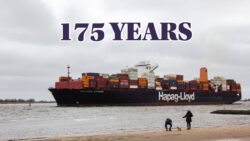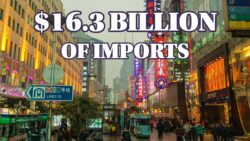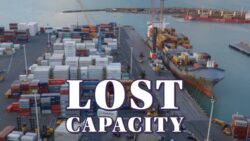The Chaos of Here and Now for Container Shipping 
On the carrier’s 175th anniversary, The Loadstar podcast editor and producer Mike King asks Hapag-Lloyd, the world’s fifth-largest container line, how the carrier is managing the chaos of the here and now?
What is being done to help shipper customers? Where will the windfalls of the last two years be spent? And what does the future hold for container shipping over the next 175 years?
Risks to Cargo Security Due to Longer Idle Times and Congestion 
5-minute read
Global cargo theft trends have shifted from the risk of in-transit, vehicle-based attacks to losses while cargo is at rest, with storage locations now critical at-risk areas.
Widespread congestion at ports and inland facilities led to increased opportunities for thieves during the period.
What You Must Know Before You Import Animals into NZ 
5-minute read
Did you know that if you are importing pets to New Zealand, they must be cleared through Customs when they arrive in the country? And you may have to pay GST and duties on some animals.
There are strict rules you must follow when bringing live animals into New Zealand. This page sets out the Customs requirements, please refer to the Ministry for Primary Industries (MPI) website for the Biosecurity requirements.
If you’re bringing an animal into NZ for commercial reasons, you’ll need to contact a Customs broker to undertake the process for you. Commercial reasons include breeding, showing and racing.
Are We Too Reliant on China? 
3-minute read
Many super-sized cities in China have been in tight lockdown for weeks as the country sticks to its zero-COVID strategy in the face of the fast-spread Omicron variant of coronavirus.
It is thought that some 340 million people, 25% of the national population, live in the 46 cities under full or partial lockdowns.
Port Omissions Hurt Importers and Exporters with Extra Costs 
3-minute read
No week goes by – nor has gone by for about two years – without New Zealand importers and exporters receiving advice of port calls omitted by shipping lines.
Usually, there are one of two reasons. Either the ship is way behind schedule, and the operator is trying to recover something of the lag time, or there is congestion at a port or ports, and the operator can’t afford to have the ship sitting at anchor for a week or two.
In New Zealand, the delays at Auckland usually cause omissions, although the effects of congestion regularly spill over to other ports. Another regular occurrence is port diversions.
The number of ships that have diverted to Northport, and have found the Marsden Point operation satisfactory, has even encouraged Northport’s owners to move forward with plans to become a bigger container operation.
The downside of port diversions to shippers comes from extra costs to get their goods to and from the destination initially nominated as the gateway. The diversion port is almost always further away from where the goods are needed.
Research has now been done which shows that a global post-pandemic economic recovery is hindered by lines skipping ports or “blanking” sailings (i.e., cancelling them outright).
The MDS Transmodal (MDST) research, commissioned by the Global Shippers’ Forum (GSF), found that global ports lost over a third of their expected capacity to ship containers during 2021, creating delays and disruption for shippers.
“Lost capacity” measures the total number of container ship slots that were expected to be available at the port but did not materialise because the port was skipped or the entire service was blanked by the shipping line.
According to MDST, Tauranga lost about a third of its expected container capacity during the second half of 2021.
However, despite the supply chain delays and congestion, Tauranga benefitted from carriers diverting calls from Auckland, which lessened the impact it would have otherwise suffered from the supply chain crisis.
In 2017 the Port of Tauranga broke through the one million figure for containers handled (i.e., loaded or discharged). The throughput gradually rose to 1.23 million TEUs in 2019.
In 2020, the first year of COVID impacts, throughput rose to 1.25 million TEUs and then in 2021, it dropped only marginally to 1.2 million, according to Tauranga’s own published figures. A reduction of about 50,000 containers is not particularly significant, given the impact that supply chain delays and congestion have had on all ports.
However, looking beyond the Tauranga port, the big picture shows that the effect of missed calls has hammered many ports and shippers worldwide.
Some ports, such as Colombo (Sri Lanka) and Port Klang (Malaysia), have been especially hard hit, with about 40% of the expected container capacity failing to arrive in the last quarter of 2021.
Other ports such as Felixstowe (UK) and Jebel Ali (UAE) failed to see around a third of their expected capacity.
A skipped call means that a scheduled sailing won’t pick up cargo, and imports won’t be dropped off.
“As a result, the collapse in service levels available to shippers at the ports affected and in the hinterlands they serve over the period is stark and amounts to far more than the inconvenience of having to wait for the next ship,” the report says.
Skipped port calls also prompt rises in freight rates, as shipping lines ‘auction-off’ available slots on the vessels that do call.
Shippers also face unexpected surcharges for the handling and storage of delayed containers.
Nations lose the opportunity to deliver their exports, which hinders the recovery of their economies from the effects of lockdowns and COVID restrictions.
Such schedule alterations translate into huge capacities lost to importers and exporters.
As the pressures caused by the COVID-19 pandemic ease, hopefully, we will see the restoration of service predictability for shippers and a return to the frequency promised by consortia and alliance operators.
But it may not be for some time yet . . .
Source: The New Zealand Shipping Gazette
P.S. Easy Freight Ltd helps New Zealand importers & exporters to save money on international freight and reduce mistakes by guiding how to comply with Customs and biosecurity rules.
➔ Contact us now to learn how we can assist you.





